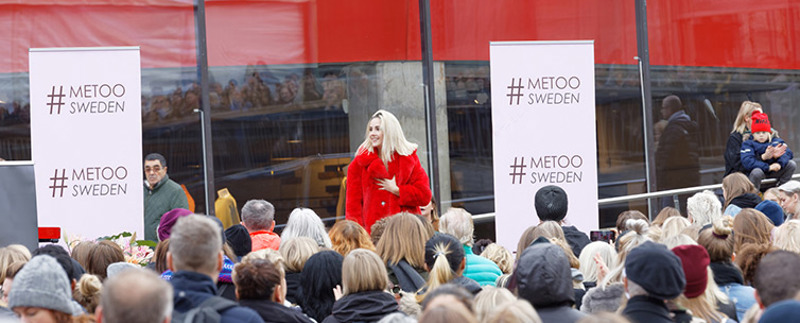STORIES FROM THE #METOO MOVEMENT
The films below are based on the stories and needs that are expressed in different #metoo appeals from some of the vulnerable groups encountered by the social services. The needs are linked to sexual harassment, abuse and violence against older women, women with disabilities, abused women, women who are deaf or hard of hearing and women who have experience of prostitution and human trafficking.

Tarana Burke
It all started in 2006 when the American civil rights activist Tarana Burke started a non-profit organisation, Just be inc, to support black girls and women who had been exposed to sexual harassment and assault. Burke coined the term “Me too” to support those affected and show that they are not alone in their experiences.
When the story of how film producer Harvey Weinstein had been harassing women for years was exposed in October 2017, the term “Me too” became common currency. The actor Alyssa Milano set the ball rolling when she encouraged everyone to use the hashtag #metoo to tell about their experiences of sexual harassment in social media.
Tarana Burke’s “Me too” is a platform for survivors of sexual assault, while the hashtag #metoo is used in a wider context. However, both are clearly connected to exposure to sex related violence. The abuse covers everything from sexual harassment to deadly, gender-based violence.
#metoo in Sweden
In Sweden, women in the theatre and film industry were the first to launch the joint hashtag #tystnadtagning (silent shoot). This bore witness to sexual harassment, violation, vulnerability and systematic silencing. #metoo grew quickly in Sweden with many different industries becoming involved. Later hashtags were initiated by groups of women, non-binary, transgender people and children and youths not connected to a specific industry sector, such as #intedinhora (not your whore), #underytan (below the surface), #slutvillkorat (final condition) and #tystiklassen (silence in class).
As a consequence of the #metoo movement, in summer 2018 the government gave specific assignments to authorities and CSOs. This was to make the work to discover, address, prevent and raise awareness of sexual harassment widely spread.
Based on the government assignment to train and inform social services and other closely related activities, the Swedish Gender Equality Agency has created five short films about the #metoo-movement. The purpose of the films is to highlight the needs that the movement has drawn attention to.
The films can function as an eye opener or as a starting point for a discussion about what the professionals who meet the target groups can do differently in order meet the needs in a better way.
#NOTTHEGOODOLDDAYS (#INTEBÄTTREFÖRR)
The woman behind #notthegoodolddays explain that guilt and shame is a heavy load to carry and that violence does not necessarily stop because you get older.
It is important to show the extent of sexual harassment and that men’s violence against women has a long history. Despite the fact that Sweden has clear legislation on people’s right to support and protection, older women’s needs have to a large extent been rendered invisible.
With the hashtag #notthegoodolddays (#intebättreförr), older women explain what they have been and are still exposed to. The testimonies of many lay the blame and guilt where it belongs – at the perpetrator’s door.
#NOTYOURWHORE (#INTEDINHORA)
#ONNOCONDITION (#SLUTVILLKORAT)
Women with disabilities are often dependent on the support of others in their everyday life. This can be personal assistance, accompanying and travel services, where the support given by society should provide security, but does not always do so. It can also be a partner or another family member.
The group describes how their dependence is often exploited. As a woman with a disability, you can become dependent on relatives or friends when society does not provide the support that is needed. This support is based on goodwill; those in need must accept the help they can get – on other people’s terms. This leads to a great imbalance of power. Daily situations where assistance is required can generate the conditions for abuse to become possible.
#TURNADEAFEAR (#SLÅDÖVÖRATTILL)
Testimonies have been received from women and non-binary individuals who are deaf, hard of hearing or deaf and blind. They testify about the lack of a safe place and the feeling that the perpetrator’s feelings are prioritised over those who are subjected to violence. The stories clearly show that the problems are structural and exist everywhere: in business, sport, schools, the church, public service and the authorities.
The group invites all concerned authorities, companies, organisations and associations to accept their responsibility and help to end the normalisation of different forms of violence towards women and non-binary individuals who are deaf, hard of hearing or deaf and blind. To achieve a change, there needs to be competence about deafness in the work of making a change.
#NOSOCIALPROTECTION (#UTANSKYDDSNÄT)
They testify that their trauma is often left untreated and that their reports to the police about abuse and assault are ignored. The movement points out that the authorities have failed them and that they are without a safety net.
It is important that the professionals who meet the target group are doubly competent i.e. have knowledge about what to do when meeting girls, women and transgender persons who are exposed to violence and have knowledge about abuse and/or drug addiction.
Publication date: 29 October 2021
Last updated: 13 June 2024
